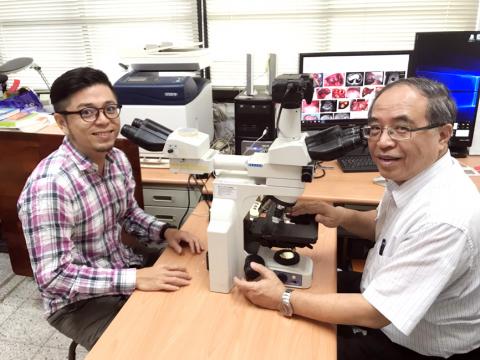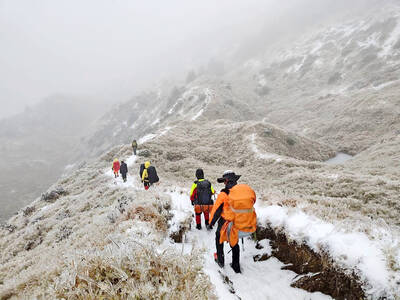National Taiwan University (NTU) veterinary medicine professor Liu Chen-hsuan (劉振軒) and his student Huang Wei-hsiang (黃威翔) have over the past few years helped lay a foundation for veterinary forensic science in Taiwan, where the field has not yet developed as a profession.
“Veterinary forensic medicine uses veterinary medicine to solve legal problems,” Liu said. “The most important task is the necropsy. The body is like a book — it is a record of the cause of death and the truth. Veterinary forensics reads between the lines to search for traces of crime and recover the truth.”
Liu previously served as chairman of the university’s School of Veterinary Medicine and superintendent of the NTU Veterinary Hospital.

Photo: Huang Chieh, Taipei Times
When he was young, he was interested in the way forensic doctors could obtain evidence and determine the cause of death from a body that could not communicate itself, Liu said.
Last year, a large number of stray dogs died in quick succession, he said.
“There were local rumors that someone was poisoning dogs,” Liu said. “But necropsy reports confirmed that the stray dogs had all been infected by a canine distemper virus because they had not been vaccinated.”
A cat owner and animal lover, Huang said he has always enjoyed mystery novels and digging for the truth.
When Huang entered the master’s program in 2011, he said that Liu told him: “Let us develop veterinary forensic medicine.”
Huang has presented his research at the annual Veterinary Forensic Sciences Conference hosted by the International Veterinary Forensic Sciences Association in Florida for four consecutive years, making Taiwan the first Asian nation to participate in the conference.
“The field of veterinary forensic medicine first originated because animal traces appeared at crime scenes and the investigators required the expertise of veterinarians,” Huang said.
Mysterious deaths of wild animals, illegal hunting, the smuggling of animal products and a rise in awareness about animal protection, as well as cases of animal torture have all led to an increased demand for the profession, Huang added.
Liu and Huang said that with the support of others, such as the Taipei Animal Protection Office, they have been able to gradually establish the field of veterinary forensic science at NTU.
They said they have built experience through requests from criminal cases and given speeches all across the country, planting seeds for veterinary forensic medicine to develop in different regions.
Due to their efforts, the Kaohsiung Animal Protection Office established a veterinary forensic medicine team early this year, they said.
Liu’s team consists only of himself, Huang and two master’s students.
Due to the shortage of hands, the team is only accepting requests from local animal protection offices at the moment, they said.
This story has been updated since it was first published.

Trips for more than 100,000 international and domestic air travelers could be disrupted as China launches a military exercise around Taiwan today, Taiwan’s Civil Aviation Administration (CAA) said yesterday. The exercise could affect nearly 900 flights scheduled to enter the Taipei Flight Information Region (FIR) during the exercise window, it added. A notice issued by the Chinese Civil Aviation Administration showed there would be seven temporary zones around the Taiwan Strait which would be used for live-fire exercises, lasting from 8am to 6pm today. All aircraft are prohibited from entering during exercise, it says. Taipei FIR has 14 international air routes and

The Ministry of National Defense (MND) today released images of the military tracking China’s People's Liberation Army (PLA) movements during the latest round of Chinese drills around Taiwan. The PLA began "Justice Mission 2025" drills today, carrying out live-fire drills, simulated strikes on land and maritime targets, and exercises to blockade the nation's main ports. The exercises are to continue tomorrow, with the PLA announcing sea and air space restrictions for five zones around Taiwan for 10 hours starting from 8:30am. The ministry today released images showing a Chinese J-16 fighter jet tracked by a F-16V Block 20 jet and the

Snow fell on Yushan (Jade Mountain, 玉山) yesterday morning as a continental cold air mass sent temperatures below freezing on Taiwan’s tallest peak, the Central Weather Administration (CWA) said. Snowflakes were seen on Yushan’s north peak from 6:28am to 6:38am, but they did not fully cover the ground and no accumulation was recorded, the CWA said. As of 7:42am, the lowest temperature recorded across Taiwan was minus-5.5°C at Yushan’s Fengkou observatory and minus-4.7°C at the Yushan observatory, CWA data showed. On Hehuanshan (合歡山) in Nantou County, a low of 1.3°C was recorded at 6:39pm, when ice pellets fell at Songsyue Lodge (松雪樓), a

NO SHAME IN RETREAT: Hikers should consider turning back if the weather turns bad or if they do not have sufficient equipment, the Taroko park headquarters said Two people died of hypothermia over the weekend while hiking on Hsuehshan (雪山), prompting park authorities to remind hikers to bring proper equipment and consider their physical condition before setting out in the cold weather. Temperatures dropped over the weekend, bringing snow to high altitudes in Shei-pa National Park. One hiker, surnamed Lin (林), who on Friday was traveling with a group of six along the Hsuehshan west ridge trail, lost consciousness due to hypothermia and died, the Shei-pa National Park Headquarters said. On Saturday, another hiker, surnamed Tien (田), in a group of five on the southeast of the west